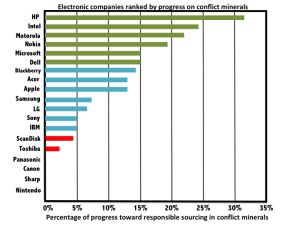In the past 15 years, over 5 million people have been slaughtered, and 300,000 women have been raped, all at the hands of war and conflict minerals.
While people around the world text, play games and Tweet all on their cell phones, millions of people have been and are continuously being killed for the minerals that make up our phones.

Technology is an important and influential aspect of our society today as 44 percent of cell owners have slept with their phone next to their bed because they wanted to make sure they didn’t miss any calls, text messages, or other updates during the night. This has become an obsession to some people and at the end of the day, as consumers, we fund the conflict by purchasing our technology.
“Sixety-seven percent of cell owners find themselves checking their phone for messages, alerts, or calls — even when they don’t notice their phone ringing or vibrating,” according to the Pew Internet Project.
But what if they found out that the very same phone that they sleep next to is funding a civil war in the Democratic Republic of Congo?
What makes up our phones?
Ninety percent of American adults own a cell phone. Fifty-eight percent of American adults have a smartphone. Conflict minerals are in every piece of technology and it is uncommon for people to take the time to figure out where everything comes from, what it takes to get the materials and who does the labor. Cassiterite (tin), wolframite (tungsten) and columbite-tantalite (tantalum) are the necessary minerals that create majority of technology in our world today.
Where do these minerals come from?
A majority of the minerals described as “conflict minerals” are determined by the Secretary of State to be financing conflict in the Democratic Republic of Congo (DRC) and other adjacent countries. However, the majority of the conflict minerals are mined in the DRC.
Raise Hope for Congo believes that the conflict minerals problem is complicated, and the suffering in Congo is immense. What is happening in the DRC is unacceptable, unjust and is up to us to push for a change.
A group of students have worked to see that Cabrini College is recognized as an institution working with the Conflict-Free Campus Initiative to push manufacturers to stop the continuous use of conflict minerals.
Why does it matter?
CFCI draws on the power of student body leadership, activism and determination to bring peace to the Congo. Through encouraging university officials and stakeholders, both large purchasers of electronics and powerful spokespersons, “to commit to measures that pressure electronic companies to responsibly invest in Congo’s minerals sector, students are voicing the demand for conflict-free products from Congo.”
Consumers create the demand for products, and if the demand is that consumers want conflict-free cell phones, that is what will eventually happen. Having conflict-free technology available for people to purchase will ensure that they are investing in a piece of technology that has minerals that were mined from a Congolese worker who is paid fairly, has quality working conditions and does not have to worry about being murdered every second of every day.

There has never been a product manufactured as a conflict-free electronic, which has been part of the problem. However, due to the pressure CFCI and other organizations have had on major corporations like Apple, there have been some positive changes in the sourcing of minerals.
According to Strategic Sourcing, “On Feb. 13, Apple announced that it has verified no conflict minerals are used by any of its tantalum suppliers.”
We applaud Apple for taking a first step. It now must move on and make sure that the other components are also conflict-free. Apple has made progress in making sure the workers who manufacture the component parts work in a safe and dignified environment. We hope that Apple and other cellphone manufacturers will be able to report soon that all our phones are conflict-free.
As consumers in our society, we have a moral responsibility to change what is going on and it starts with one of the most important pieces of technology today, our cell phones.
This is a genocide, but no government wants to say that because they would then have to act on that statement according to the Geneva Convention. People from the Congo are killing each other in large amounts every day and nothing about that is okay. It’s repulsive that human beings kill other humans. It is appalling and harrowing that it took over 15 years for big manufacturers to do something to change the transparency of their production and supply chain, and that there are still some companies who continue to use conflict minerals. It is our moral responsibility give voices to the voiceless and stand with those pushed down, in solidarity.


